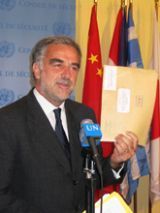ICC Chief Prosecutor rejects Sudanese Justice Minister statements
By wasil Ali
Feb 27, 2007 (THE HAGUE) — ICC Chief Prosecutor Luis Moreno-Ocampo dismissed Sudanese Justice Minister Mohammad Ali al-Mardi statement that there is no evidence to incriminate any of the two suspects named by the world court Tuesday.

Ocampo filed a request with the pre-trial judges to issue summonses to appear for Ahmed Haroun, former interior minister of state and state minister for humanitarian affairs, and militia commander Ali Mohamed Ali Abdelrahman, also known as Ali Kushayb.
Al-Mardi was quoted as saying that Haroun was already interrogated in relations to events in Darfur but there was no evidence against him. Al-Mardi also rejected the claim by the ICC’s prosecutor that Kushayb was a Janjaweed leader.
In a response to a question by Sudan Tribune as to how all these resources that were made available to Haroun could not incriminate other senior Sudanese officials, Ocampo underlined that he is guided by evidence and the threshold as defined by the Rome Statue. The chief prosecutor added that Haroun’s superiors could not be prosecuted simply because he reported to them. Ocampo would not say whether he is through with investigating the events of Darfur in 2003-2004 when the peak of violence has occurred but mentioned that his office is evaluating the situation on the ground today and the spillover of violence to Chad and the Central African Republic.
Ocampo rejected the notion that the decision to indict these two people only means that he exonerates other members of the Sudanese government.
When asked why he made his filings and the names public in contrast with the other cases he is handling of Uganda and the Congo, Ocampo said that the policy is to try to be as public as possible and that in this case all witnesses were outside Darfur so their security was not an issue and thus he could reveal the suspects names.
Ocampo also said that if Sudan tries to conduct its own trials of these two individuals then they have to challenge the jurisdiction of the court before the judges who will determine if the case is still admissible.
(ST)
